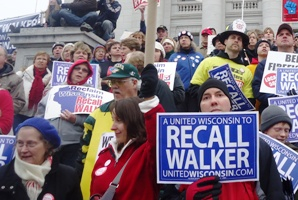Wisconsin public workers face harsher work rules and shrinking paychecks as contracts expire and additional provisions of Governor Scott Walker’s anti-union bill set in. State unions are being forced to shift from a decades-old servicing model to an organizing model in a fight for their survival.
New compensation rules took effect January 1, increasing the amount employees pay toward benefits. Union contracts for the majority of state workers were terminated, though some county and municipal employees still have contracts in place.
Walker’s bill banned collective bargaining over everything but wages, eliminated dues check-off, and stipulated that unions hold annual elections to maintain certification. It required that public employees, who have traditionally accepted lower wages than private sector employees in exchange for better benefits, take 10 to 15 percent pay cuts to fund their health care and pensions.
Workers must now pay 10 percent of their medical bills up to a yearly maximum of $500 for individuals and $1,000 for families. This comes on top of earlier insurance givebacks in August. “People are feeling a tremendous pinch,” says C. Estelle Clark, an AFSCME Local 2748 member. “They already weren’t making ends meet before this.”
Clark says take-home pay at the state’s Department of Workforce Development is now less than it was 10 years ago.
UNCERTAIN RULES
State agencies have been told to develop new policy manuals on work rules—without worker input. As of mid-January, many have yet to do so, leaving employees to work under uncertain conditions.
“It’s chaos. You’re just supposed to go to work and do whatever they tell you,” says Troy Bauch, a staffer for AFSCME Council 24 in northern Wisconsin. He reports changes in scheduling for shift employees and an increase in firings and discrimination cases.
Just days after the plan went into effect, an AFSCME local president at the University of Wisconsin-Milwaukee was fired for absences dating back to August. According to Bauch, management waited for union work rules to expire so it could “discharge her without recourse.”
Janitors at the University of Wisconsin-Madison will soon receive an effective 6 percent pay cut when a new policy mandating unpaid lunch breaks kicks in. Management is denying union reps access to certain buildings on campus, too.
Decades-old grievance procedures outlined in contracts have been replaced by state and local civil service procedures. Union members have lost the right to file grievances over discrimination, performance evaluations, scheduling and work assignments (including overtime), and the content of work rules or policies.
Independent third-party arbitrators have been replaced by staff from a state agency that is led by a Walker-appointed corporate lawyer from a union-busting law firm.
DIRECT ACTION
Without contracts to protect working conditions, some unions are turning to direct action—and winning. Where a grievance would have been filed before, “now it’s ‘get people to the picket line,’ says Ed Sadlowski, an AFSCME Council 40 staff rep. “Direct action gets the goods.”
To protest management’s ban on union paraphernalia in the workplace, Local 6 President Ron McAllister came to work January 5 at the Lincoln Hills School juvenile corrections facility wearing an AFSCME T-shirt.
Told to remove the shirt, he stood bare-chested and was sent home without pay. The union promptly began organizing for a rally. Though management quickly repealed the illegal ban, the rally went on as planned four days later, with 75 people in attendance.
“Management realized it was beyond their control,” said Bauch.
When highway workers in Jefferson County were told that overtime would no longer be assigned by seniority, they marched on the boss with a petition signed by every employee. By the next day, the old policy had been restored.
USING DUES TO ORGANIZE
Unions have been hit hard by Walker’s elimination of dues check-off. While some smaller shops and a number of locals in the northern part of the state have managed to retain high levels of dues-paying members, Wisconsin Professional Employees Council steward Barbara Smith says the share of members in good standing has dropped below 25 percent at some state agencies.
Despite this, Smith sees a silver lining in the pressure the new situation is putting on unions to engage their members. Across the state, unions have launched campaigns to encourage members to “recommit” to their union as dues-payers, signing up for automatic deductions from their bank accounts.
More than just fundraising efforts for unions with diminishing resources, door-to-door canvasses, phonebanks, and membership meetings have served as an opportunity for members to discuss why belonging to a union is important in the first place—conversations that many feel should have been happening all along.
At first, staffers lobbied members of Estelle Clark’s local on their own. Members started joining staffers for house visits, she said, “because they could relate better to their co-workers,” and gradually started learning organizing skills themselves. House visits became a way not only to talk to inactive members but also to develop leadership skills among activists.
The most successful efforts to increase the ranks of dues payers have been member-led. AFSCME members at the Rock County highway shop decided they would all open accounts at the same credit union. Seventy-six out of 80 are now members in good standing.
“Walker said the county couldn’t collect our dues,” said Local 1077 President Marv Vike. “We’re just going through a different route.”
LONG HAUL AHEAD
Efforts to recall Walker and four Republican state senators have also been an organizing tool for unions working to deepen member engagement.
Thousands of members were among the activists who collected about 1 million signatures on the petition to recall Walker, far outpacing the 540,000 needed to trigger a new election.
Even if Walker gets the boot, a vote of the legislature, still majority-Republican, would be required to overturn his anti-union legislation. It’s unlikely that collective bargaining rights will be restored any time soon.
Nonetheless, says Bauch, there’s no alternative but to fight. “We’re a few yards away from Mississippi,” he said. “If Walker gets a few more years, there will be no separation.”





